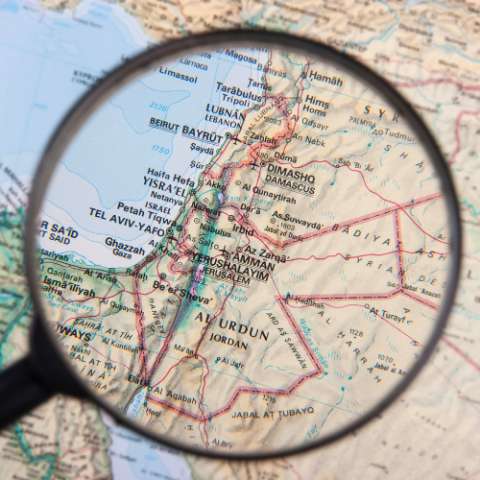Diaspora, Exile and Interreligious Dialogue (2024-2025)
Background
Jews, Christians and Muslims have lived for millennia in global diasporas, extending beyond nation-states. At different times, intervals and locations, members of all three religious communities experienced exile from their native lands. Each developed their own concept of return, restoration and healing.
Israeli Jews and Muslim and Christian Palestinians are the most recent example of people who have undergone exile, live in diasporas and dream of return. But neither sees the exile of the other nor recognizes the other’s dream of restoration.
Looking at Middle East politics, you would not know that these traditions developed in conversation. Religion is used to deepen national rifts. Efforts to develop a political solution to the Israeli-Palestinian conflict endeavor to sideline religion instead of using ample religious resources for mutual recognition and healing, founded in the affinities of diaspora, exile and restoration.
Project Description
This project centers religious dialogue as a pivotal component of the path to peace by exploring the affinities of Jewish, Christian and Muslim conceptualizations of exile. Team members will work together to:
- Develop a body of research on Christian, Jewish and Muslim conceptual affinities of catastrophe, exile and restoration.
- Initiate campus interreligious dialogue, facilitating meaningful conversation on Israel and Palestine.
- Bring Duke research, teaching and interreligious dialogue to other academic communities via a week-long joint summer school and international conference organized by the International Network for Interreligious Research and Education (INIRE).
Team members will collectively engage with foundational texts of Judaism, Christianity and Islam, to learn how they engage with philosophical traditions on freedom, justice, reconciliation, human suffering and healing. Students will then launch research projects extending across disciplinary approaches, from literary to historical to social interpretive to constructive. Projects will seek to build bridges and highlight shared predicaments across traditions.
Anticipated Outputs
Research papers; publications; digital and multimedia stories; engaged dialogue and scholarship on interreligious exile and the Middle East
Student Opportunities
Ideally, this project team will include 2-4 graduate students and 4-8 undergraduate students with interests in religion and curiosity and empathy for religious traditions other than their own.
Priority will be given to students enrolled in the courses of the Transformative Ideas Program and in the Science and Religion in Public Life Focus cluster. Undergraduate students who have demonstrated scholarly interest in the Abrahamic traditions, and graduate students engaged with exile and diaspora are also encouraged to apply.
In Fall 2024, this team will meet biweekly on Fridays from 8:30-10 a.m. Students on the team will gain familiarity with Middle East cultures, acquire new conceptual tools to navigate religion and culture, and learn to engage constructively in debates on the Middle East. They will also have the opportunity for international scholarly engagement through the INIRE summer school and conference, gaining tools for lifelong engagement as global citizens.
Timing
Fall 2024 – Summer 2025
- Fall 2024: Identify research topics; launch individual projects
- Spring 2025: Engage in small group learning; present research
- Summer 2025: Present at INIRE’s international conference and summer school; finalize online publication
Crediting
Academic credit available for fall and spring semesters; summer funding available

Team Leaders
- Abdullah Antepli, Sanford School of Public Policy
- Polly Ha, Divinity School-History of Christianity
- Malachi Hacohen, Arts & Sciences-History
- Peter Casarella, Divinity School-Theology
/graduate Team Members
-
Allison Watterbarger, Divinity-THD
-
Muhammad Usama, History-PHD
-
Avital Schkolnik, Religious Studies-PHD
-
Yazmeen Nunez, Theological Studies-MA
-
Syed Habeeb Tehseen, German Studies-PHD
/undergraduate Team Members
-
Eliana Balle
-
Allen Ryu
-
Leila Zak
-
Rachel Field, Biology (BS)
-
Mariam Dohadwala
/yfaculty/staff Team Members
-
Serena Bazemore-Center for Jewish Studies
-
Ross Wagner, Divinity School-New Testament
-
Reut Ben Yaakov, Arts & Sciences-Asian and Middle Eastern Studies
/zcommunity Team Members
-
International Network for Interreligious Research and Education (INIRE)
-
Hannah von Franz, University of Leipzig
-
Thekla Funke, University of Leipzig
